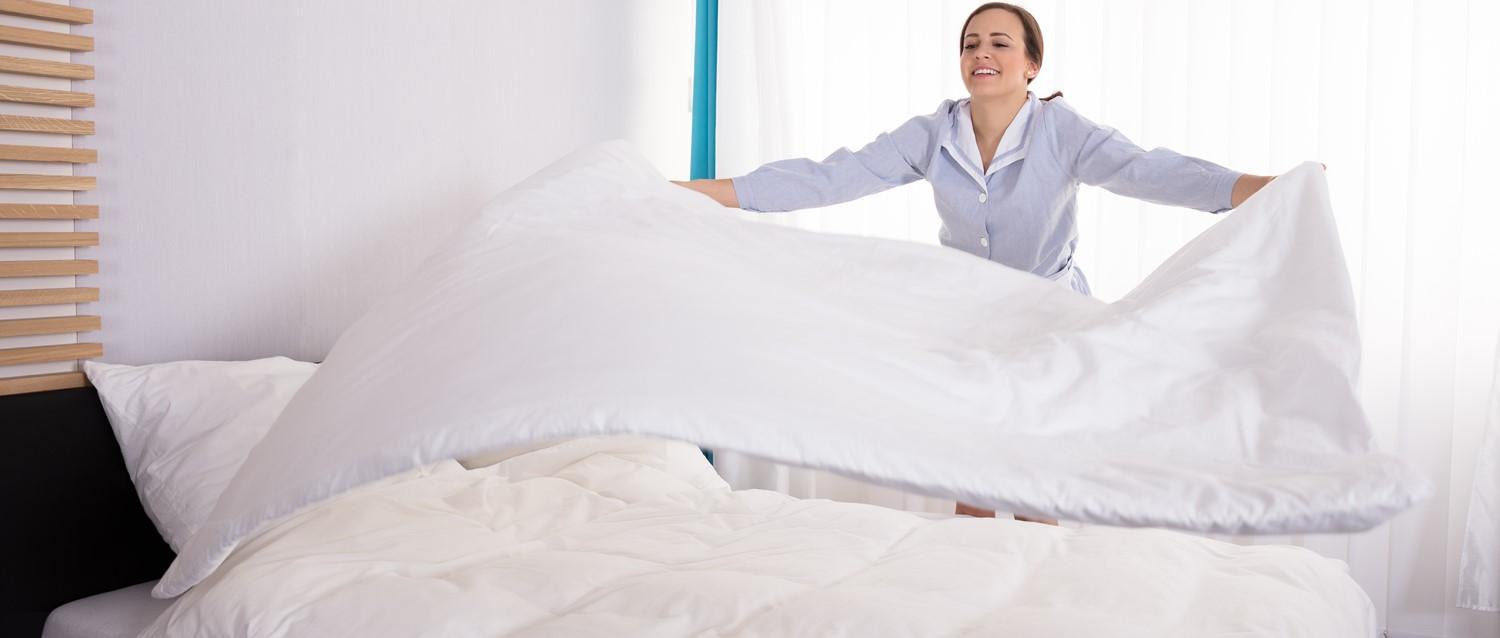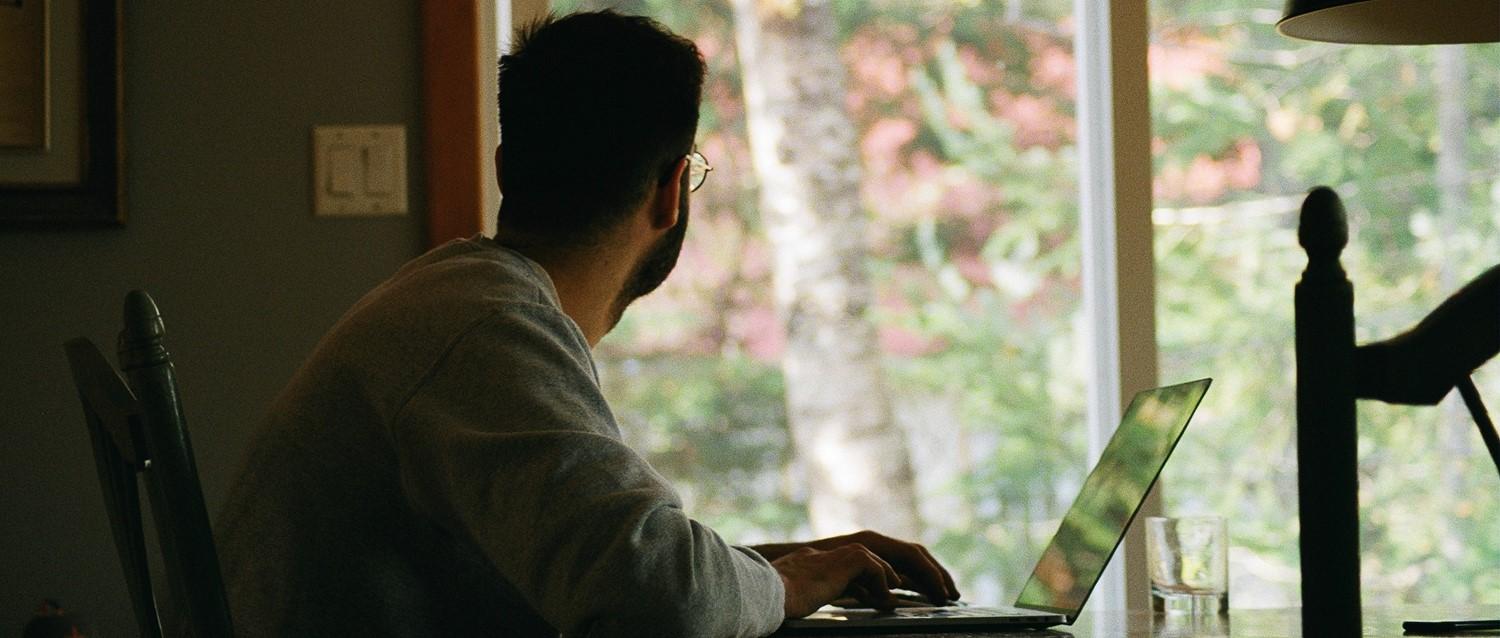
What are the mental health benefits of making your bed in the morning?
Peer reviewed by Dr Sarah Jarvis MBE, FRCGPLast updated by Emily Jane BashforthLast updated 17 Jan 2022
- DownloadDownload
- Share
Making the bed in the morning is a simple task that many don't think twice about - perhaps it's the first thing you do after waking up. However, for others, making the bed can feel like a real challenge. If you're striving to adopt healthier habits, let's explore the benefits of making your bed.
In this article:
Continue reading below
What does the research say?
People with messier homes (particularly as a result of hoarding) tend to have more issues with emotional regulation, stress, and their mental health. Therefore, those who have a tidy living space have been found to be more goal-driven and conscientious.
It's important to remember that many studies showing two facts are connected don't prove that one causes the other. For instance, people who live in a disorganised environment may do so because they have problems with their mental health, rather than the messiness leading to mental health issues. However, therapists and doctors agree that there are no downsides to living in a more organised home and many are firmly convinced that a tidy house can make for a tidy mind.
Having a tidy environment can be especially important for elderly people, as studies have shown a tidy space can improve or retain brain function and enhance their general quality of life.
And it isn't just your own personal life that can benefit from a tidy environment. One study found that having a tidy living space can increase your generosity. Volunteers who filled out surveys in a neat room were more likely to say they wanted to donate to a charity, compared with those who were questioned in a messy room.
Furthermore, having a clutter-free environment and abstaining from hoarding can improve:
Sleep quality.
Decision-making.
Organisation.
Creativity.
Ability to focus.
General satisfaction with life.
So, why should you make your bed every morning?
It can take anywhere between 18-254 days for a person to form a new habit, with an average of 66 days for a new behaviour to become automatic. With that information in mind, you could be just two months off becoming that person who incorporates making their bed into their morning routine without a second thought.
Let's delve into the benefits of making your bed.
Starts your day off on a positive note
Making your bed first thing is a positive act, which could put you in a mindset to tick off other items on your to-do list and fulfil your responsibilities for the day. This increase in motivation can greatly benefit other areas of your life, such as work, as you may become more tolerant of colleagues and inspired to accept new opportunities. It can even improve your relationships (a poll found that bed-makers have more sex) and friendships if you become better at communicating and have an overall zest for life.
Additionally, making your bed when you don't want to - perhaps on a gloomy Monday morning - can help enforce mental discipline. While your brain and body might try to resist making the bed, engaging your mind and bringing its attention back under your control can help you develop more self-discipline.
Offers a sense of accomplishment
Making your bed in the morning can feel like an achievement in the morning. You can view it as an accomplishment before you've even eaten your breakfast.
If you are someone who struggles to make their bed (perhaps due to lack of motivation or mental illness), trying to get into the habit of doing so could be a real mood-booster. Despite being a mundane task, it can be something to celebrate if it frequently presents challenges. Particularly if you're in a slump and lacking in self-belief, the act of making your bed proves you can accomplish something. Bed-making is not a cure for mental health conditions, such as depression: however, it can help you adopt a more optimistic mindset and regain a small sense of control over your life.
After tidying your bed up, you can then head towards the day knowing you've already had a victory and there's a freshly made bed for you to come home to.
Increases productivity
Making your bed each morning can be a 'keystone habit'. Keystone habits produce a ripple effect where one little positive change has the potential to produce other smart choices and positive changes throughout the day.
Writer on the science of productivity Charles Duhigg explains in his book, The Power of Habit: "Making your bed every morning is correlated with better productivity, a greater sense of well-being, and stronger skills at sticking with a budget. It's not that a family meal or a tidy bed causes better grades or less frivolous spending. But somehow those initial shifts start chain reactions that help other good habits take hold."
Retired US Navy admiral William H. McRaven, echoed this in his book aptly titled Make Your Bed. In a commencement speech at the University of Texas in 2014, he advised graduates that "changing the world starts by making your bed".
"If you make your bed every morning, you will have accomplished the first task of the day. It will give you a small sense of pride, and it will encourage you to do another task, and another, and another. And by the end of the day, that one task completed will have turned into many tasks completed," he said.
Furthermore, a study of 1,000 people (500 regular bed-makers and 500 not) found 82% of the bed-makers believe completing a small task early in the day helps them be productive all day. 79% added that making the bed is an important part of starting the day right, and 74% of bed-makers said they felt accomplished at the end of the day.
Boosts your mood
We spend approximately one third of our lives in our bedrooms. Therefore, a tidy bedroom can help calm your mind and help you feel grounded, as opposed to being surrounded by disorganisation.
A neatly made bed can not only make your room look more inviting, but it can create an atmosphere of tranquillity. As a result, this can lift your mood and lighten your emotional burdens.
Gretchen Rubin, author of The Happiness Project, found during research for her book that: "Outer order leads to inner calm." She wrote that one of the most common simple changes that led to happiness is learning to make the bed each morning.
Improves your sleep
A National Sleep Foundation poll found that participants who reported regularly making their bed were 19% more likely to say that they got a good night's sleep most nights. This is because they are falling asleep in a tidy, organised bedroom. 75% also said that clean, fresh sheets improved their quality of sleep.
Sleepopolis also found that sleeping in an organised room not only helped 62% of participants feel relaxed before going to sleep but also more energised when they woke up.
Non-bed-makers are more likely to be night owls who snooze their alarm in the morning, while those who make their bed tend to wake up naturally without needing an alarm.
Billionaires including Jeff Bezos and Bill Gates have argued that getting a good night's rest is crucial to your health, despite the world's toxic productivity culture and pressure to be constantly 'hustling'.
Famous entrepreneur Arianna Huffington admits she gets eight hours of sleep each night and says: "It's a complete delusion to think you can be productive on very little sleep.
You can succeed much more effectively, and much more sustainably, and with much less damage to your health and your relationships."
Makes you more outgoing
One survey of 2,000 people in 2018 found that making the bed is more than just a personal preference. The research suggested you can actually tell a lot about a person's personality based on whether they make their bed. The study discovered that bed-makers tend to be adventurous, confident, sociable and high-maintenance, while people who don't make their beds are typically shy, moody, curious and sarcastic.
Continue reading below
Are there any cons to making your bed?
While there are facts and statistics to suggest making your bed will positively influence your life, it can be argued that it has cons as well.
For example, the Canadian Medical Association Journal reported that making a bed can be strenuous and adversely affect your health if it results in injury. Most beds are low to the floor, and making them requires constant lumbar flexion as you repeatedly bend over to tuck in sheets. Therefore, it's important to make your bed carefully if you struggle with back pain or have mobility issues.
There is also an argument in favour of leaving your bed unmade so it has a chance to breathe. Since house dust mites - a common cause of allergic symptoms such as cough, runny nose and wheeze - like warm, damp places (such as your sheets after you've been sleeping and occasionally sweating on them), Experimental and Applied Acarology says leaving the sheets untucked during the day results in fewer dust mites. This could help you breathe more easily if you have a dust allergy.
Patient picks for Healthcare

General health and lifestyle
How will not going back to the office affect our health?
Whether you long to be back in a swivel chair or plan to Zoom from bed forever, either way many office workers will by now have firm opinions on remote work. As more and more employers launch 'hybrid working', employees must now count the physical and mental costs of a year of working from home.
by Ellie Broughton

General health and lifestyle
Exercise and physical activity
Doing regular physical activity can make people feel good about themselves and it can have a number of benefits for health. For example, it reduces the risk of developing heart disease, stroke, high blood pressure, many cancers, type 2 diabetes and 'thinning' of the bones (osteoporosis). Regular physical activity also helps to control weight and ease stress. Ideally, the aim should be at least 30 minutes of moderate-intensity physical activity on at least five days of the week but even 10 minutes is better than nothing. You should aim to do at least a couple of sessions of muscle-strengthening activities per week as well.
by Dr Pippa Vincent, MRCGP
Why might people struggle to make their beds?
People who struggle with depression can find everyday tasks like making the bed challenging. This could be a result of constant fatigue, feelings of hopelessness and a lack of motivation.
Not only does depression often lead to messiness, but studies have shown that clutter produces anxiety and can make people feel more depressed since disorganisation can impact how the brain works.
As an example, one study looked at dual-income married couples with at least one school-aged child at home. The wives who perceived their homes to be cluttered or in need of attention had higher-than-average levels of the stress hormone, cortisol, throughout the day.
In comparison, those who weren't feeling cluttered, which included most of the men in the study, had cortisol levels that tended to drop during the day. Again, this study doesn't prove cause and effect - women might have messy homes because they're stressed and time-pressured, and this (rather than the mess) might be the cause of the high cortisol levels. However, making your bed in the morning won't do any harm and these studies suggest it might help.
Additionally, messiness can influence emotions, behaviour, relationships and eating habits.
While it's easy to suggest simply cleaning your room and making your bed if you are depressed, it can take a lot of building yourself up to do that or even to leave the bed at all.
Here are some tips for tidying when you are depressed:
Break big tasks down into smaller ones.
Focus on one room - or one corner of a room - at a time.
Set a timer.
Create a list so you can tick off tasks once you've completed them.
To avoid getting distracted, practise concentration exercises.
Listen to upbeat music or a motivational talk while tidying.
Try to clean and put stuff away as you go, so it doesn't mount up.
Ask your family members and friends for a hand.
If you require support for depression, you should reach out to your GP who can refer you for talking therapy or prescribe antidepressants if appropriate. Alternatively, you can refer yourself for talking therapy on the NHS if you live in England.
You can also find support at:
Article history
The information on this page is peer reviewed by qualified clinicians.
17 Jan 2022 | Latest version

Are you protected against flu?
See if you are eligible for a free NHS flu jab today.

Feeling unwell?
Assess your symptoms online for free